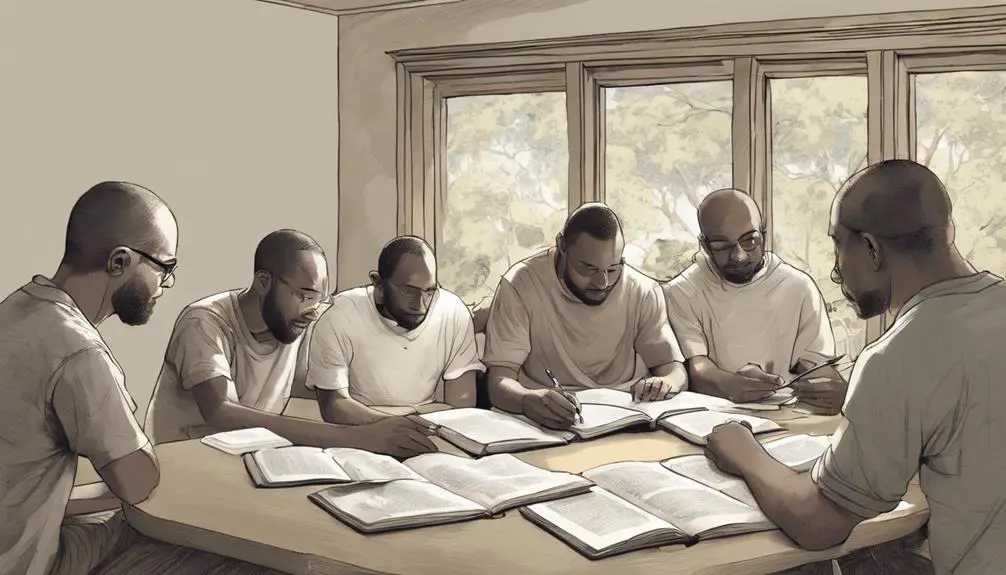Contemplate the profound lessons in 1 Peter 4, as we delve into the mystery of suffering, the potency of love, and the promise of glory.

1 Peter 4 Bible Study Questions
Imagine walking through the ancient landscapes of the Bible, pebbles crunching underfoot as you grapple with the thought-provoking questions raised in 1 Peter 4.
You're asked to reflect on the nature of suffering, the power of love, and the glory that awaits. How do you interpret Peter's advice to the early Christians in this complex chapter?
What lessons can you draw for your own life today? Let's unpack this together, for there's much to explore in this rich and challenging text.
Key Takeaways
- Reflect on how suffering can refine faith and character as depicted in 1 Peter 4.
- Consider the role of sacrificial love in creating harmonious relationships and Christian communities.
- Examine how transformative applying teachings from 1 Peter 4 can be in one's life.
- Discuss how commitment to God's will and heartfelt prayer provide guidance during trials.
Understanding 1 Peter 4 Context

To fully grasp the profound teachings of 1 Peter 4, you must first delve into the historical and cultural context in which it was written. Peter's first epistle was probably composed around 60-64 AD, a time of significant social and religious unrest in Rome. Christians were a marginalized group, often subjected to ridicule, discrimination, and even violence. Peter's audience was largely composed of Gentile converts, struggling to reconcile their new faith with a society that didn't understand or accept them.
Understanding this context is crucial to interpreting 1 Peter 4. The chapter is a call to perseverance, encouraging believers to stand firm in their faith despite suffering. It also emphasizes the importance of community, exhorting Christians to love one another, use their gifts to serve each other, and maintain a hospitable spirit. These weren't abstract teachings, but practical instructions for a community under duress.
As you delve deeper into 1 Peter 4, remember this context. It'll help you understand not just the meaning of Peter's words, but also their importance for his original audience and for Christians today.
Analyzing Key Verses

Delving into the significant verses of 1 Peter 4, you'll notice Peter's emphasis on enduring hardship, utilizing spiritual gifts, and fostering love within the Christian community. This isn't a superficial examination but a meticulous study of the Apostle's teachings.
1 Peter 4:8 stands out, 'Above all, love each other deeply, because love covers over a multitude of sins.' Here, Peter's urging for intense, sacrificial love is evident. He isn't suggesting casual affection, but a deep-seated love, one that forgives and overlooks shortcomings. This verse is a call to action, a plea for forgiveness, and a commandment for unity among believers.
In 1 Peter 4:10, Peter discusses spiritual gifts, 'Each of you should use whatever gift you have received to serve others, as faithful stewards of God's grace in its various forms.' This verse delineates the purpose of spiritual gifts; they're not for personal elevation, but for the edification of the Christian community.
The verse 1 Peter 4:12, 'Dear friends, don't be surprised at the fiery ordeal that has come on you to test you, as though something strange were happening to you,' alerts believers to expect hardships. It's a reminder that trials are part and parcel of the Christian journey.
Reflections on Suffering and Glory

Reflecting on the theme of suffering and glory in 1 Peter 4, it becomes evident that Peter sees a profound connection between the trials we face and the glory that awaits believers. He perceives suffering not as a pointless hardship, but as a transformative process that refines faith and character. This mirrors the gold refining process, where intense heat purges impurities, producing a purer, more valuable substance.
Peter's perspective, however, isn't merely philosophical. It's deeply rooted in his understanding of Christ's own suffering and subsequent glory. You're reminded that Christ, after enduring the cross, was exalted at God's right hand, serving as a model of the glory to come.
In this sense, suffering is seen as a means to an end, a pathway to greater glory. It's not to be sought, but when encountered, it's to be borne with grace, knowing that it's temporary and transformative. There's an undeniable tension here, between the present reality of suffering and the future promise of glory. Yet, Peter's words offer comfort and hope, reminding us that the trials we endure have a purpose and a promise: the refining of our faith and the assurance of future glory.
Peter's Perspective on Love

Often overlooked, Peter's perspective on love presents a transformative and compelling facet of his teachings, emphasizing the importance of sincere, selfless affection in the life of a believer. Love, in Peter's view, isn't an emotion; it's a choice, a commitment, a practice that requires patience, sacrifice, and humility.
This perspective on love is clearly highlighted in 1 Peter 4:8, where he stresses, "Above all, love each other deeply, because love covers over a multitude of sins." This passage underscores the power of love to forgive, heal, and transform relationships.
For your understanding, here's a table that offers a simple breakdown of this concept:
Peter's Perspective on Love |
Biblical Reference |
|---|---|
Love as a choice and commitment |
1 Peter 1:22 |
Love as a practice requiring patience and humility |
1 Peter 3:8 |
Love covers a multitude of sins |
1 Peter 4:8 |
Love as the key to harmonious relationships |
1 Peter 3:8-9 |
Love as the foundation of community |
1 Peter 2:17 |
Understanding this perspective can help you delve deeper into your spiritual journey, shedding light on how Peter views love as a transformative force in the life of a believer.
Applying 1 Peter 4 Today

In light of Peter's teachings in 1 Peter 4, you can unleash a transformative power in your life today, harnessing the concepts of selfless love, heartfelt prayer, and unwavering commitment to God's will. These concepts aren't just abstract notions; they're practical, actionable strategies that can shape your life and relationships.
Firstly, selfless love, as Peter teaches, isn't about receiving but giving. You're called to love others deeply, even when it's challenging. This doesn't mean you're to be a doormat, but rather, to seek the best for others, even at personal cost. Doing so, you'll find that your relationships become more meaningful and fulfilling.
Secondly, heartfelt prayer becomes a powerful tool when used consistently. Prayer isn't just about asking for things; it's about aligning your will with God's. It's about seeking guidance, expressing gratitude, and developing patience and humility.
Lastly, an unwavering commitment to God's will is about obedience. It's about trusting God's plans for your life, even when they don't align with your own. It's about surrendering control and finding peace in the process.
Conclusion
In dissecting 1 Peter 4, we've delved into the theological context, analyzed key verses, reflected on suffering, glory, and love, and considered application for today. Peter's words challenge us, encouraging endurance amidst trials and urging sincere love.
Through scholarly analysis, we interpret his words, not just for historical understanding, but for personal growth and spiritual enrichment.
Continue to dig deeper, applying these insights to your faith journey.



Sign up